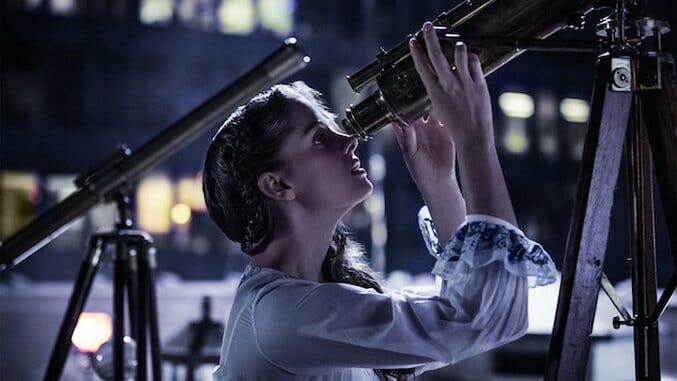In “Head Full of Snow,” American Gods Travels Through Worlds with Ease
(Episode 1.03)
Image courtesy of Starz
In a visually stunning episode, American Gods erases the lines between reality and fantasy. Shadow (Ricky Whittle) has been struggling with illusion versus reality since he met Wednesday (Ian McShane). In the previous episode, “The Secret of Spoon,” Wednesday asks Shadow when he would know if he was losing his mind. In this episode, Shadow begins to accept that he isn’t delusional, and the things he’s seeing and doing may be real.
“Head Full of Snow” delves into a fantasy world so rich and beautiful, I never wanted to leave. The sky often acts as a portal into different worlds in American Gods, and the sky is a key reason Shadow begins to accept the fantasy he’s fallen into. Wednesday asks Shadow to think of snow, and when Shadow visualizes the icy crystals of a snowflake, it’s not long before they start falling from the sky. Rooftops, reached by stairways to the sky, facilitate transitions between reality and fantasy. Stairs to the roof are featured both in the opening, when a woman dies in her Queens apartment and Anubis (Chris Obi) takes her to judgment, and when Shadow ventures onto the roof to meet the final Zorya sister, Zorya Polunochnaya (Erika Kaar).
We haven’t seen much of the women in American Gods yet. Audrey (Betty Gilpin) is allowed to be grief-stricken and messy in the premiere, which was great, but the female gods sometimes seem more archetype than human. This sort of makes sense, since gods are mythical archetypes, but the youngest Zorya sister highlights the issues with this. She herself is a fantasy: a charming, if a little quirky, young and beautiful girl who doesn’t get cold on a freezing Chicago rooftop. She is a manic pixie dream god, who asks Shadow for a kiss.
The oldest Zorya sister, Zorya Vechernyaya (Cloris Leachman), seems more complex, thanks mostly to Leachman’s performance. She also elevates the characters around her. For example, we see more of Wednesday’s personality by the way he reacts to Zorya Vechernyaya. I love that Wednesday flirts with her as much as with any young woman—it’s nice to see an older woman feel desired. Wednesday also doesn’t seem bothered that Zorya Vechernyaya says he will die and fail; he shrugs it off as if it’s nothing at all. In fact, even after hearing this, Wednesday is so confident that he robs a bank. (Is it that Wednesday isn’t facing reality? Or can he will his fantasy into reality, like Shadow with the snow?)
-

-

-

-

- Curated Home Page Articles By Test Admin October 21, 2025 | 3:10pm
-

- Curated Home Page Articles By Test Admin October 21, 2025 | 2:57pm
- Urls By Test Admin October 21, 2025 | 2:57pm
- Curated Home Page Articles By Test Admin October 21, 2025 | 2:55pm
-

-

-

-

-

-

-

-

-

-

-

-

-

-

-

-

-

-

-

-

-

-

-

-

-

-

-

-

-

-

-




































